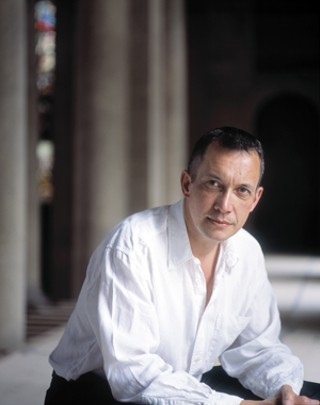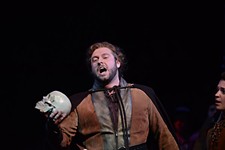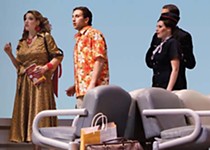'Flight'
Terminal music
By Robert Faires, Fri., April 8, 2011

Think back to the last time you were in an airport waiting to board: the anticipation of the journey but maybe also the frustration of delay, the varied types of individuals around the terminal, a little cross section of society also in transit. Okay, you're primed for the next Austin Lyric Opera production. Flight takes place in an airport terminal, where a range of characters – a diplomat and his wife, a younger couple on holiday, an older woman waiting for a younger man, a steward and a stewardess – are stranded overnight, along with a refugee who has made the terminal his home. Composer Jonathan Dove says the saga of Mehran Karimi Nasseri, the Iranian who did live in a terminal lounge at Charles de Gaulle Airport from 1988 to 2006, was the spark for his 1998 comic opera, but he and librettist April De Angelis expanded its scope to explore the lives of several different people on their own personal journeys. From its premiere, the work has been embraced enthusiastically by the opera world, with numerous productions in Europe, Australia, and North America. Now it flies into Austin, with Dove making his own passage to Texas for the local premiere.
Austin Chronicle: To get to Austin for this production, you of course had to go through airports. Has your experience of that changed since you wrote Flight? Jonathan Dove: One of the things that made me write Flight was that I do get excited about flying. And that's still the case. Whenever I get on a plane, I find my head full of music. It happened on the way over here, too. I'm very grateful for it. It's such ... I don't know. It's an exciting thing, but it's a magical thing, lifting you out of your everyday life. And that's probably why I suddenly get music that I wouldn't have thought of before. When April De Angelis and I came across the true story of the refugee living in Charles De Gaulle Airport, I think I was partly drawn to it because I thought, "Oh, then I'm going to write some flying music."
AC: But the experience of the terminal is very different from the experience of being actually on the plane and in the air.
JD: Yes, there's a lot of waiting. Indeed, when I changed at Houston to come to Austin, there was a delay, and that is absolutely part of everyone's experience. In our opera, people are stranded overnight, and when you're in places [of] travel after hours, things happen that wouldn't ordinarily happen. People have conversations that they wouldn't otherwise have, find themselves talking to someone that they wouldn't necessarily talk to, and it's that kind of chemistry that makes possible the events that happen in the opera.
AC: Did you have any expectation of how Flight might be received before it premiered? JD: Well, I didn't know we were writing a hit if that's what you mean. No, I was incredibly nervous, actually. I'd certainly written a piece that I wanted to see, but until the dress rehearsal was over, I didn't know that necessarily anyone else would want to see it. In that first production, there was excitement making it, but still you don't know what an audience coming into it cold will make of it, whether they want to go along for the ride – or the flight, in this case. Until the dress rehearsal. At that point, I could hear that the audience was laughing at some of the jokes, so I thought it was possible then that it would reach people. It's had several productions, and I've heard lots of different singers sing it, so I've come to accept that the piece itself is actually quite robust, and it communicates well.
AC: And it travels. What do think that people respond to in the opera?
JD: It's hard for me to say. One thing is that people take away very different impressions of what the piece is about. There are quite a lot of different elements to it. In a way, you're looking at a little world, and each character has their own journey that they're on and their own dilemmas. The central character of the refugee has a metaphorical allegorical aspect. He certainly does challenge all the other characters in the piece. But he also asks for their help, and they're initially reluctant to give it, but when they do give it, they are kind of released to go on their way. So on that mythic level, people respond to those things. But on a more superficial level, it's a contemporary story, it's sung in English, it's a situation that people can relate to because most people have been stranded in an airport. But it hasn't been treated a great deal in opera. So I think it's interesting for people to see a world that they think they're familiar with but to see it in a new light because people sing. They're eavesdropping on the inner lives of people who would ordinarily be a mystery.
Flight will be performed Saturday, April 9; Wednesday, April 13; Friday, April 15, 7:30pm; and Sunday, April 17, 3pm, the Long Center, 701 W. Riverside. For more information, call 472-5992 or visit www.austinlyricopera.org.











